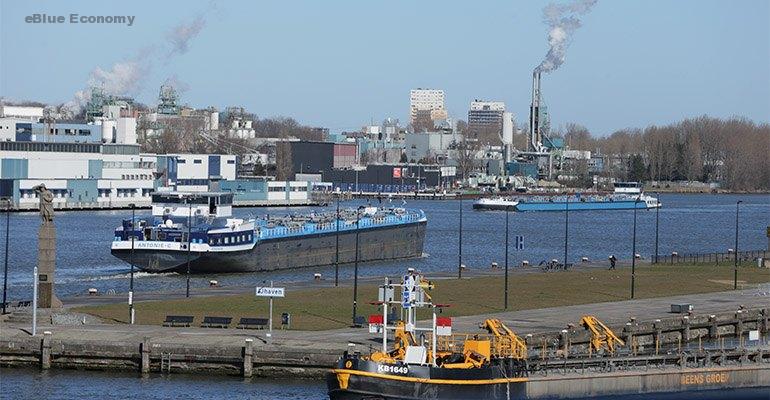-
The Green Methanol Cooperation (GMC) wants to establish green methanol on the market
-
Green methanol is carbon-neutral and can be extracted from the air
-
Environmentally friendly solution to stricter regulations in the maritime industry
Uniper is now working together with the shipping service provider Liberty Pier Maritime Projects and the engineering firm SDC (Ship Design & Consult) to establish green methanol on the market as a sustainable and carbon-neutral marine fuel. As a hydrogen carrier, green methanol is easier to transport and store than green hydrogen.
It burns clean, is liquid at ambient temperatures and pressures and is also biodegradable. Green methanol is carbon-neutral overall, as it is produced using hydrogen from renewable sources and CO2from the atmosphere via a biological feedstock or direct air capture.
According to a 2017 report by the ICCT (International Council on Clean Transportation), global CO2 emissions from shipping amounted to about 932 million tons in 2015.
As for many other sectors, the challenges of climate change are becoming increasingly important for the maritime industry. According to a 2017 report by the ICCT (International Council on Clean Transportation), global CO2 emissions from shipping amounted to about 932 million tons in 2015.
As a result, international and national regulators, on the one hand, are setting new and ambitious standards and limits, particularly for allowable emissions from shipping – for example, the IMO (International Maritime Organization) has set a reduction target of 70% by 2050 compared to 2008;— on the other hand, the maritime industry and energy companies are also pursuing sustainable marine fuels of their own accord.
On this basis, green methanol is seen as a sensible solution for decarbonization, both for European coastal shipping and international deep sea shipping. It can also be used for specialist applications, such as cruise ships and inland navigation.
Uniper, Liberty Pier Maritime Projects and SDC Ship Design & Consult have joined forces to form an open collaboration — the Green Methanol Cooperation (GMC). The GMC will develop the infrastructure and logistics framework needed to supply methanol in Europe and establish the relevant shipping requirements. A medium-term goal of the GMC is to build ships that can burn green methanol in their engines. The project will initially focus on European coastal shipping using ships with a load capacity of 5300 and 8300 tons and container feeders.
The three companies have committed to using a completely digitalized and transparent approach to their collaboration, allowing them to forge ahead with the project in accordance with the Poseidon Principles and ESG principles. All three partners are certain that green methanol will play an important role in the maritime fuels sector in the future:

eBlue_economy_David Bryson, COO Uniper SE
David Bryson, COO Uniper SE: “Providing and using green methanol as a fuel for the maritime industry is a logical step in the implementation of our hydrogen strategy within the wider framework of our decarbonization efforts. With Liberty Pier and SDC, we have gained two experienced and knowledgeable partners from the maritime industry who want to collaborate with us to establish green methanol as a maritime fuel on the market.”

eBlue_economy_Dietrich Schulz.
Dietrich Schulz, CEO Liberty Pier: “Working with Uniper and SDC in an open collaboration reflects the current requirements for European short-sea shipping — all parties involved, from suppliers, tonnage providers and regulators through asset providers and shipping agents, need to work together to further develop and modernize this sector.”
Michael Wächter, Managing Director SDC: “The targets for reducing CO2 emissions in shipping can be implemented rapidly and economically if we start with the technology on board and use green methanol as fuel

About Uniper
Uniper is an international energy company with around 12,000 employees in more than 40 countries. The company plans to make its power generation CO2-neutral in Europe by 2035. With about 35 GW of installed generation capacity, Uniper is among the largest global power generators. Its main activities include power generation in Europe and Russia as well as global energy trading, including a diversified gas portfolio that makes Uniper one of Europe’s leading gas companies.
In 2020, Uniper had a gas turnover of more than 220 bcm. Uniper is also a reliable partner for municipalities, public utilities, and industrial companies for developing and implementing innovative, CO2-reducing solutions on their way to decarbonizing their activities. As a pioneer in the field of hydrogen, Uniper is active worldwide along the entire value chain and is implementing projects to make hydrogen usable as a mainstay of energy supply.
The company is headquartered in Düsseldorf and currently the third-largest listed German utility. Together with its main shareholder Fortum, Uniper is also the third-largest producer of CO2-free energy in Europe

About Liberty Pier Maritime Projects
Liberty Pier Maritime Projects GmbH & Co. KG (Liberty Pier) is based in Bremen and has subsidiaries in Leer, Germany and in Shanghai. Liberty Pier is an independent provider of maritime services underpinned by the Hanseatic values of reliability, dependability and responsibility. The Liberty Team has established strong international networks and unites decades of experience in all sectors of the shipping industry: particularly in Asset Management and Finance, Project Coordination Controlling as well as Chartering and Sale & Purchase. Liberty Pier is ISO 9001 and ISO 14001 certified.
![]()
![]()
About SDC Ship Design & Consult GmbH
SDC Ship Design & Consult GmbH is located in Hamburg, Hamburg, Germany and is part of the Engineering Services Industry. It has been active internationally for over 20 years in the all sectors of the shipping industry. As a daughter company of the Hamburg Ship Model Basin (HSVA), the firm focuses on the development of efficient and fuel-optimized ship designs and engages in particular with the technical implementation of environmentally friendly ideas. SDC Ship Design & Consult GmbH services from shipyards and engineering firms to ship owners and classification societies.
press release














